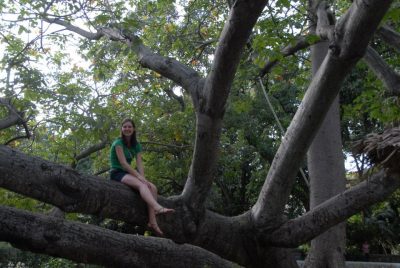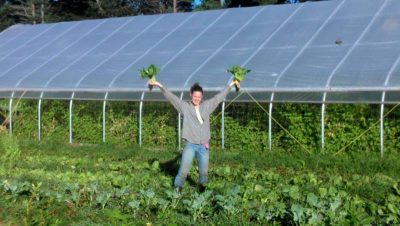
Photo courtesy of the L.E.A.F. Project PA website
Turning Over a New L.E.A.F.
Mackenzie Johnson (’16) came to Carlisle by way of Hamilton, MA. A Policy Management and Spanish double major at Dickinson College, Mackenzie was very familiar with the political, social, and environmental issues surrounding food production both domestically and abroad. Outside of the classroom, Mackenzie continued exploring the ways in which these inequalities affect the Carlisle community, specifically through her work with the after school program Farm, Cook, Eat (FCE).

Photo courtesy of Mackenzie Johnson.
Providing farm and food-based education to Title One elementary school students in the area inspired Mackenzie to continue teaching youth about food, its production, and different experiences growing, preparing, and eating it. Designing and implementing curriculum through Farm, Cook, Eat gave Mackenzie the hands-on experience that would serve her in a post-graduate position as Program Coordinator at The LEAF Project PA. The LEAF Project PA is an organization that “employs young people from diverse backgrounds by giving them positions doing meaningful work in the food system.” Mackenzie’s responsibilities include creating work schedules, managing youth workers through completion of tasks and special projects, teaching leadership skills, and sharing the work LEAF does as well as learning about related development work worldwide.
Mackenzie’s position at LEAF allows her to stay connected with the Dickinson community that shaped her professional goals. The people she met and worked with, whether still in the area or not, connected Mackenzie to the land. For her, farming became more than just a botanical phenomenon. The benefits to mind, body, and spirit that Mackenzie experienced made her excited to be a permanent part of the sustainable food system and farming community. And she continues to learn, expanding her network and her knowledge of sustainable agriculture with each farm visit her students take.
Mackenzie’s experience first as the student and now as the teacher, are evidence that we truly never stop learning. She continues to challenge herself by approaching environmental and agricultural education as an exploration of the truth rather than a rattling off of the facts. Encouraging her students to critically analyze their own experiences and opinions rather than throwing “simplified judgements at them” is one example of the ways Mackenzie is challenging her students and her peers to push boundaries in work, education, and life. Mackenzie is embracing the unknown of the long-term. Content and gratified in the inspiring work she is doing, she’s along for the ride…making pit stops at farm stands along the way.
